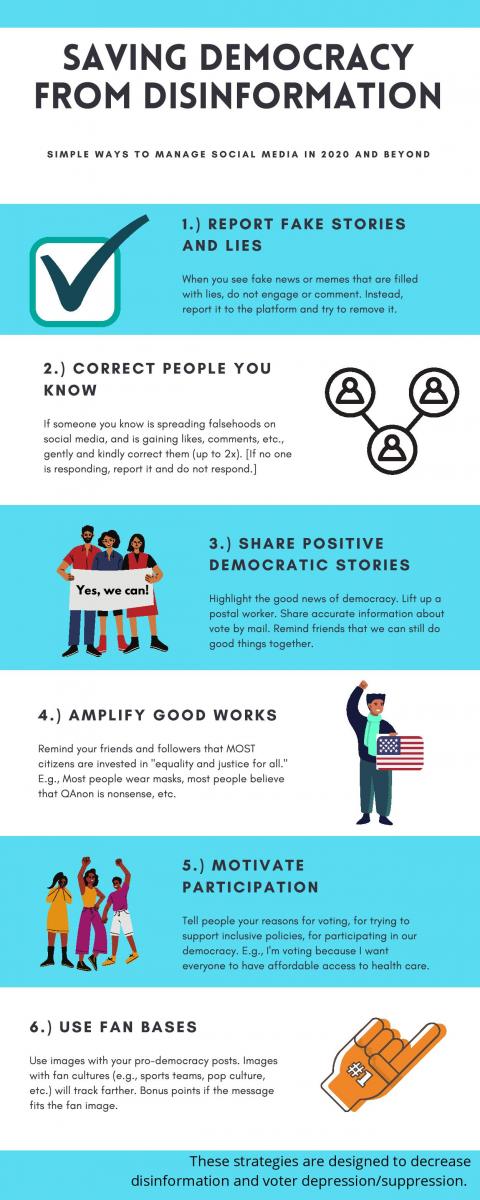 Disinformation is one of the most widespread issues of our time.
Disinformation is one of the most widespread issues of our time.
Defined as false information deliberately and often covertly spread (as by the planting of rumors) in order to influence public opinion or obscure the truth, disinformation has long been around, but today is being amplified by technological tools – specifically social media.
In a recent study, researchers specifically found that "exposure to social media is associated with misperceptions regarding basic facts about COVID-19," drawing a clear link between people and their behaviors and attitudes. Simply put, the power of social media can easily lead its users to believe falsehoods.
Global Security Initiative’s Narrative, Disinformation and Strategic Influence research team lead by research Scientist Scott Ruston at Arizona State University, has studied disinformation to understand how it shapes the social and political landscapes that influence daily life, and to help the population recognize, mitigate, and become more resilient to it.
In ASU’s Disinformation and democracy: A Q&A with Scott Ruston, Ruston breaks down disinformation and its effect on democracy, offers insight into social media’s role in aggregating information, and shares advice for defending oneself against such information.
As we move into the 2020 election, there are many tactics we can all take as individuals right now to recognize and prevent the sharing of false or misleading information online.
Suggested by a disinformation and democracy expert at Baylor University, the following are defensive and offensive strategies to help protect yourself and others against disinformation on social media.
Defensive Strategies to Manage Disinformation
- If you see disinformation from a source you do not know personally (not a friend), do not engage. Report it and try to get it removed.
- If you know the source of the disinformation and no one has commented, report it and move on.
- If you see disinformation from a friend and someone has commented, gently and kindly correct it 1-2x and then move on.
Offensive Strategies to Manage Disinformation
- Share positive stories about progressive issues. There is a lot of good in our democracy and we need to fortify belief in our democracy before people are too disaffected to vote. (i.e. Lifting up postal workers and thanking them for their hard work, or offering accurate and useful voter information about voting-by-mail, etc.)
- Restore faith in the will of the people and democratic ethos. (i.e. Most people believe masks will work). Although not all is well, the goal of this strategy is to counter voter depression and intimidation. Negative stories are true but unhelpful to the goal of getting the vote out.
- Motivate people for why we should vote and participate in democratic systems. (i.e. I'm voting because I want my children to have access to affordable health care). Or share good reasons to participate – this may include good stories about Biden/Harris, good things that different counties/states are doing, or efforts that are preserving democracy.
- Use fan bases! Use fandom for RBG, sports teams, pop culture, whatever. Tapping into shared love will always help a message become more receptive, and it's key that the image resonates with the message itself.

Download SavingDemocracyfromDisinformation.pdf here.
We all have a long way to go to combat the authoritarian impulse and disinformation. This is a marathon, not a sprint. So, these kinds of messages should be the strategy right now – and that may change over time, but for now, this is the best path forward.
Additional Reading Material
Why Do People Share Disinformation On Social Media? – Centre for Research and Evidence on Security Threats
Research Finds Social Media Users Are More Likely To Believe Fake News – Forbes
You are probably spreading misinformation. Here’s how to stop. – Washington Post
Weapons of Mass Distraction: Foreign State-Sponsored Disinformation in the Digital Age – U.S. Department of State
Fighting Coronavirus Misinformation and Disinformation – Center for American Progress
Disinformation On Facebook Could Affect The Way You Vote (5-minute Listen) – NPR
On Facebook, Misinformation Is More Popular Now Than in 2016 – NY Times
How misinformation spreads on Twitter – Brookings.edu
Instagram is targeting fake coronavirus news and finally taking disinformation and hoaxes seriously – Business Insider
Written by Jessica Noyes, Communications Coordinator, WMA
Add new comment